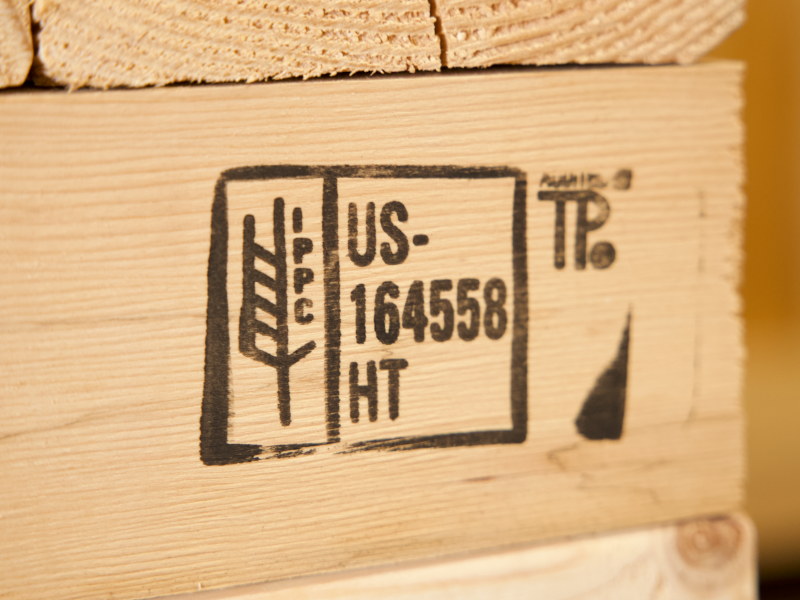For businesses involved in global trade, adhering to the International Standards for Phytosanitary Measures No. 15 (ISPM 15) is non-negotiable. This regulation ensures that wood packaging materials (WPM) used in international shipping do not spread pests or diseases, protecting ecosystems and trade relationships worldwide. For businesses in Phoenix, Arizona, ensuring compliance with ISPM 15 is critical for smooth and efficient international shipping.
This guide explains what ISPM 15 compliance involves and how to meet its requirements effectively.

What is ISPM 15?
ISPM 15 is a set of guidelines developed by the International Plant Protection Convention (IPPC) to regulate wood packaging materials in international trade. These guidelines are essential for preventing the spread of invasive species through untreated wood.
Who Must Comply?
Any business shipping goods internationally using wooden crates, pallets, or skids must comply. Common examples of regulated wood packaging include:
- Wooden crates and boxes.
- Wooden pallets and dunnage.
- Skids or blocking materials.
For businesses in Phoenix shipping goods globally, ensuring all wood packaging meets ISPM 15 standards is essential.
Key Requirements for Compliance
- Wood Treatment
All wood packaging must undergo one of the following treatments:- Heat Treatment (HT): Wood is heated to a minimum core temperature of 56°C (132.8°F) for at least 30 minutes.
- Fumigation with Methyl Bromide (MB): This treatment eliminates pests but is increasingly restricted due to environmental concerns.
- Marking with the IPPC Stamp
Treated wood must display the IPPC stamp, also known as the “wheat stamp.” This mark includes:- The IPPC symbol.
- A two-letter country code of origin.
- A unique identification number for the treatment provider.
- The type of treatment (e.g., HT for heat treatment, MB for methyl bromide).
- Exclusions
ISPM 15 does not apply to:- Wood packaging made from processed wood products (e.g., plywood, OSB, fiberboard).
- Packaging that does not contain solid wood components.

Why ISPM 15 Matters
- Protects Ecosystems: Prevents the spread of invasive pests that can devastate local flora and fauna.
- Avoids Shipping Delays: Non-compliance can result in detention, rejection, or destruction of shipments.
- Builds Trade Relationships: Compliance ensures smoother operations and fosters trust between trade partners.
- Reduces Liability: Avoids fines and reputational damage due to non-compliance.
Steps to Ensure ISPM 15 Compliance
- Source Certified Wood Packaging
Work only with suppliers who provide ISPM 15-certified wood materials. Verify that their products display the required IPPC marking. - Use Exempt Materials
When possible, use plywood or composite wood products, which are naturally pest-resistant and do not require ISPM 15 treatment. - Partner with Experts
Engage professional crating services to ensure compliance. Experienced providers will handle certification and design solutions tailored to your shipment needs. - Inspect Regularly
Inspect wood packaging for visible damage or signs of infestation before shipping. Replacing compromised materials ensures continued compliance. - Stay Informed Regulations may vary across countries. Familiarize yourself with additional phytosanitary requirements in your destination markets.
Challenges and Solutions
- Mislabeled or Missing IPPC Stamps
Solution: Work with certified suppliers and double-check that all packaging carries the correct marking. - Regional Variations in Regulations
Solution: Research destination-specific regulations and consult logistics professionals when shipping to new markets. - Restricted Use of Methyl Bromide Solution: Opt for heat treatment, which is widely accepted and environmentally friendlier.
Benefits of Compliance
- Seamless Trade Operations
ISPM 15 compliance minimizes delays and disruptions, ensuring goods reach their destination on time. - Enhanced Sustainability
Proper treatment methods and reusable wood packaging support environmentally friendly practices. - Global Market Access
Meeting phytosanitary standards builds credibility and facilitates trade in regulated markets. - Cost Savings
Avoid fines, penalties, and costs associated with rework or rejected shipments.
Conclusion
ISPM 15 compliance is more than a regulatory obligation—it’s a vital component of responsible and efficient international trade. By sourcing certified materials, partnering with experts, and staying informed, businesses can ensure their shipments are secure, compliant, and environmentally sound.
Need help with ISPM 15-compliant crates? Contact us today to design custom crating solutions that meet international standards and protect your shipments.



